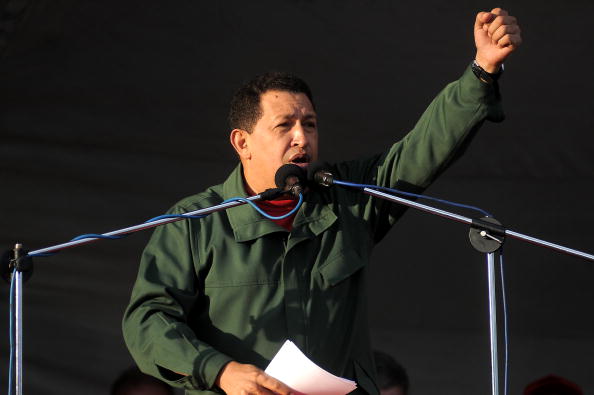During the thirteen years, ten months, and six days that he cavorted on the world’s television screens, between his first inauguration as president of Venezuela and his disappearance from public view last December, it remained impossible to know what to make of Hugo Chávez, who died Tuesday at the age of 58. Dancing, laughing, chattering, threatening, singing, bullying, always in your face, the comandante who in military rank was really only a lieutenant colonel has mostly left behind a void. During his years in power one never had to worry about whether conversation at a Venezuelan dinner party or a neighborhood dance would take off: there was always Chávez, and indeed, only Chávez, to bewail, praise, mock, or pray to. He was the only problem and the solution to every problem. In his endless, ravening ambition—the ambition of the fat man who inhales expansively in order to take up more room in the elevator—he was All.
The endless contradictions of Chávez, who did not like shedding blood, his own or anyone else’s: he called off a brief and amateurish coup he put together in 1992 against a popularly elected president, and began his own campaign for president at the very moment he was conceding defeat. “For now…we have not controlled power,” he said into reporters’ microphones at his arraignment (and who was the chump who allowed that public statement of defiance from a prisoner about to be court-martialed?) Chávez’s unrepentant challenge charmed Venezuelans. Released from prison, he won the 1998 presidential election handily.
All these years later, it’s still hard to know whether his was a dictablanda (a soft dictatorship) or not. For all his anti-imperialist fulminations, the flow of Venezuelan oil to US ports was not interrupted for a single day. For all his socialist preaching, his country remained firmly capitalist.
The Chávez mystery: he took over a country ravaged by corruption and poor administration and, mostly, a collapsing international price for oil, which is virtually the only product Venezuela has to sell the world. In his years in power, oil—which accounts for 30 percent of the GDP and of which Venezuela is one of the world’s top ten producers—went from nine dollars a barrel to nearly one hundred and fifty and remains currently at or near one hundred. Despite being able to draw on such a huge windfall for a small country (the population is a fairly stable 30 million), chavismo distinguished itself by a series of disasters—housing, infrastructure, agriculture, electricity, food distribution, and public safety among the most salient—while oil production declined thanks to fantastic levels of mismanagement. And yet Chávez easily won his fourth election just last October, at a time when he had already been operated on for cancer three times and it was hard not to notice that he was dying, despite his refusal to provide any information on the progress of the cancer that would kill him.
He cared about people. He defied Venezuelan racism and leapt over his country’s class barriers. Having come from abject circumstances himself, he brought significant improvements in health, education, and public welfare to the poor, right in the neighborhoods where they live. He was defiant. He was macho. According to former President Jimmy Carter and other sober-minded observers, he reduced poverty by dramatic percentages. He repeatedly poked the United States in the eye and ran away like a mischievous schoolboy, giggling. He adored himself. But other rulers with similar records have failed to be Chávez and withdrawn from public office before an indifferent audience, or been forced out by crowds who would have torn them limb from limb. It is safe to say that Chávez, now dead and about to receive the funeral of a saint, will in his afterlife influence the politics and social mores of his country for years—perhaps decades—to come, like the Latin American leader he most resembled, Juan Domingo Perón of Argentina. Or rather, as Perón and his wife Evita have, for in his complicated appeal (and his manner of dying, too) Chávez resembles both.
He was not the first president to fail, or to remain popular while failing. But it was his Peronist brand of popularity that so many found disturbing; the passion with which his name was roared at enormous public gatherings, the hatred he brought forth in his followers when he denounced the imperialists, the sharks, the would-be assassins of Venezuela, the traitors, the sneaking cowards who dared to disagree with him. And now we see the desperate weeping of millions of Venezuelans who feel that they have lost not a president or a politician or a great leader but something else: a father, a savior, a protector and soother of the orphan who lives in fright inside us all.
Advertisement
Perhaps in trying to evaluate the astonishing rule of Hugo Chávez the question to ask is this: whether the people he leaves behind regressed into a kind of childhood faith and dependency under his spell and what the price of such regression might be. Perhaps this is the state brought forth by those rulers we call caudillos—willful chieftans who rule by force of personality—of which Hugo Chávez Frías may have been the greatest of all. “There is no chavismo without Chavez,” he proclaimed repeatedly. Who now will dry Venezuela’s tears?


